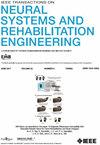TBI-Related EMG Characterization of Neuromuscular Responses to Anterior Perturbations While Standing
IF 5.2
2区 医学
Q2 ENGINEERING, BIOMEDICAL
IEEE Transactions on Neural Systems and Rehabilitation Engineering
Pub Date : 2025-07-24
DOI:10.1109/TNSRE.2025.3592477
引用次数: 0
Abstract
Traumatic brain injury (TBI) causes deficits in sensory systems, sensorimotor integration, and/or neuromuscular response, thus impairing essential postural response mechanisms such as compensatory postural adjustments. This, in turn, results in balance deficits and increases the risk of falls, affecting the activities of daily living and quality of life. Therefore, the goal of this study is to quantify the differences in neuromuscular responses based on electromyography (EMG) between people with TBI (pwTBI) and age-matched healthy controls (HCs). We investigated the differences between eight HCs and nine pwTBI in the following EMG characteristics: muscle activity (EMG) onset, EMG burst area, and median frequency, in response to anterior (forward) platform perturbations at four different amplitudes during standing. The results showed delayed muscle activation onset, larger EMG bursts, and decreased EMG median frequency in pwTBI compared to HCs, suggesting an altered neuromuscular response to platform perturbations in pwTBI.站立时神经肌肉对前摄动反应的脑损伤相关肌电图特征。
创伤性脑损伤(TBI)导致感觉系统、感觉运动整合和/或神经肌肉反应的缺陷,从而损害基本的姿势反应机制,如代偿性姿势调整。这反过来又会导致平衡能力不足,增加跌倒的风险,影响日常生活活动和生活质量。因此,本研究的目的是量化基于肌电图(EMG)的TBI患者(pwTBI)和年龄匹配的健康对照(hc)之间神经肌肉反应的差异。我们研究了8个hc和9个pwTBI在以下肌电特征方面的差异:肌肉活动(EMG)开始,EMG爆发面积和中位数频率,在站立时对前(前)平台的四个不同振幅的扰动的响应。结果显示,与hc相比,pwTBI的肌肉激活延迟,肌电图爆发更大,肌电图中位数频率降低,表明pwTBI中神经肌肉对平台扰动的反应发生了改变。
本文章由计算机程序翻译,如有差异,请以英文原文为准。
求助全文
约1分钟内获得全文
求助全文
来源期刊
CiteScore
8.60
自引率
8.20%
发文量
479
审稿时长
6-12 weeks
期刊介绍:
Rehabilitative and neural aspects of biomedical engineering, including functional electrical stimulation, acoustic dynamics, human performance measurement and analysis, nerve stimulation, electromyography, motor control and stimulation; and hardware and software applications for rehabilitation engineering and assistive devices.

 求助内容:
求助内容: 应助结果提醒方式:
应助结果提醒方式:


